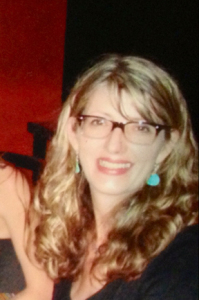(Jerri Bell) Tell me about how you chose to start writing.
(Emily Rich) I went through a really rough period where I had two chronic conditions before I got cancer. And then my mom got cancer, and that just brought up a lot of memories I needed to deal with. I am not somebody who does well in therapy, so I started taking classes at The Writer’s Center in Bethesda, just as my own therapy to work through stuff, and I got the bug. I started doing workshops and I loved it. And it helped me deal with what I was going through.
(JB) What part has writing played in your own recovery journey? How specifically did getting it out help you?
(ER) Most people will tell you that it’s not healthy to keep things bottled up inside. My mother was the champion of that, and I learned a lot of those behaviors from her. When something’s going wrong, you don’t talk about it. You just keep it hidden. Writing has forced me to confront my own demons. What helped me the most was the process of having to be very careful and think through things as I put it on the page. It clarified the trauma and my response to it. I’m a big blocker-outer, so I had buried a bunch of stuff. Just working it out on my own was very helpful.
(JB) How did you choose the specific incidents that you were going to use for “Malignancies?” What about those incidents made you choose to put them together for a piece to submit to r.kv.r.y quarterly?
(ER) Once I started thinking back on it, this incident when I went home for my mother’s first diagnosis captured our family dynamic. I had always set out to write about my mom and my relationship in the last few months of our relationship – dealing with flashbacks and unpleasant memories. And yet…she was dying. I didn’t want to be cruel. I certainly wasn’t going to bring up all my resentment, at least not to her, at that point.
(JB) Did writing about the childhood trauma trigger anything? How did you deal with it, when it brought up something that you weren’t quite done processing?
(ER) There’s a Robert Frost quote that I kept in mind when I was writing: “No tears in the writer, no tears in the reader.” I cried a lot when I was writing some of those scenes. Sometimes you can work through it, and sometimes you have to step away until you calm down. On the other hand, if you hit a vein and you’re really feeling something, sometimes it’s good just to get that out.
(JB) A while back, we both read Alison K. Williams’s essay “Don’t Be Brave” in Brevity. She talks about approaching “difficult material” in a constructive way, and I think you managed that brilliantly in “Malignancies.”
(ER) She writes about dealing with the drama of the moment, not just the drama of the situation – putting people in a scene, and letting the scene represent the larger situation. As an editor, getting lots of submissions, I wish I could send that quote out to people. They talk about trauma in generalities, and it’s very hard for the audience to relate to that. It helps to slow it down – to put the trauma in a scene, and to focus on the action. It makes a greater connection with the writer when she doesn’t tell you how to feel, or how to react.
(JB) And she talks about ending on a moment of empowerment. You start “Malignancies” with a question: will I let my mother visit so soon after my own cancer diagnosis, or not? Then you take readers on the journey of what happened the last time your family was in this kind of stressful situation together, so we understand why, at the end of the essay, you choose a different path for handling your own diagnosis. That decision was your moment of empowerment. As an editor, I see that as the kind of resolution that readers need to feel that they’ve been taken somewhere good.
(ER) I wanted to show myself in what I think is a true light – not just as an innocent victim. Going through traumatic events is confusing. Especially as a child, you just go along with a lot of what happens. That’s why I put in the scene with the dog. I feel guilty that I took my kids to that house, at a stressful time when I knew my dad wouldn’t be able to control himself. Even as a child, I never had the feeling that I deserved my father’s abuse – I never blamed myself in that way. But I did inherit the family response of burying stuff that needed to be dealt with.
(JB) Have you shared any of your writing with your family?
(ER) My husband’s family is a big cheering section. But it makes my husband uncomfortable to read my essays – I think that he doesn’t like to think about me in that way. All my kids have read some of the essays, and my daughters have both read my draft memoir. I think it has been great for them to be able to see where their mom is coming from. It was strange for them that we were so close to my husband’s family when they were growing up, but we never saw my family. So this explains a lot. And I’ve shared some essays with my younger sister. We had both buried a lot of stuff, so this has brought it up in the open and brought us closer. Now we can talk about it.
(JB) Tell me about some of your favorite memoirs, and why you think they’re good.
(ER) This Boy’s Life, by Tobias Wolff; Don’t Let’s Go to the Dogs Tonight, by Alexandra Fuller; and The Glass Castle, by Jeanette Walls. I still have a tendency to look back on myself as a little kid and feel sorry for myself. But I don’t get that feeling when I read those memoirs. When you’re with the protagonists in those books, even with the traumatic things that happen to them and the bad situations they’re in, you’re still with that little kid. Even when you’re experiencing something traumatic, you’re still just a little kid, having your little-kid thoughts, dealing with things in your own little-kid way. Those books capture that well. I’d love to be able to get in touch with that side of my past. Another memoir that I enjoyed is Wild, by Cheryl Strayed. She’s so honest about her own shortcomings, and her struggle to overcome them. I think that’s why so many people have responded to the book.
(JB) What advice would you have for other writers who are just starting to explore trauma through writing?
(ER) If you’re going through that trauma in the moment, if you’re dealing with your own illness or that of someone you love, or God forbid, through some sort of domestic violence, do write it all down. But know that you may need to step away from it for a while. When it’s so fresh in your mind, it’s hard to step away and see the bigger picture, or to bring a reader in. You’re so much in your own head dealing with it. When I first wrote about my cancer, I put in every detail of every medical appointment, every test, what it felt like to be on the phone. There’s just so much stuff. And you think you’ll remember everything – but you won’t.
(JB) How do you define recovery for yourself – both physical recovery, and psychological or spiritual recovery? Which was harder to write about?
(ER) Physical recovery is so much easier. When you’re recovering from a disease, there are certain milestones that you look for. I recovered from the surgery. I recovered from the chemo treatments. The hair grows back, your energy comes back – it’s easy to quantify that. And you’ve got the doctors, they’re always telling you yes, you’re making progress. So it’s easy to watch your own recovery from something physical that has an end point, though of course it’s different if you’re dealing with something chronic.
(JB) And psychological recovery from a childhood trauma is a different process?
(ER) Much different. It’s so nebulous. You don’t know if you’ve reached it, or if you ever really will. My sister, who’s in the story, just emailed me an article from the New York Times – “To Stop Violence, Start at Home” by Pamela Shifman. (http://www.nytimes.com/2015/02/03/opinion/to-stop-violence-start-at-home.html) Both of us are still dealing with the issues from growing up. She said, “I cried, and then I thought how amazing it is that you and I both managed to break the cycle…not to have our sons and daughters grow up thinking that home violence is normal.” It made my day when she sent me that message. My dad’s mom was an abusive alcoholic – he grew up miserable, and then he made his own family miserable, and I think it’s a measure of my emotional recovery that my dad and I went opposite ways.
Jerri Bell, a retired naval officer, is the managing editor for O-Dark-Thirty (www.o-dark-thirty.org), the literary journal of the Veterans Writing Project. VWP founder Ron Capps realized that writing was key to his recovery from severe post-traumatic stress that nearly cost him his life. He created the Veterans Writing Project to bring no-cost writing seminars to veterans across the country, give them the tools to tell their stories, and publish their work.



Pingback: Malignancies | Rkvry Quarterly Literary Journal